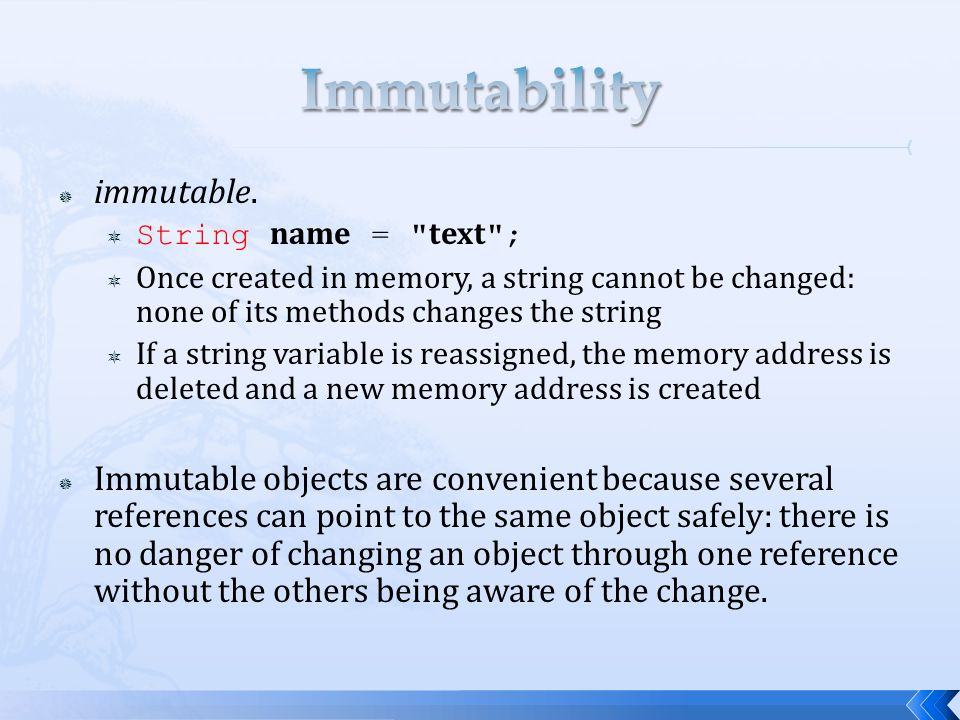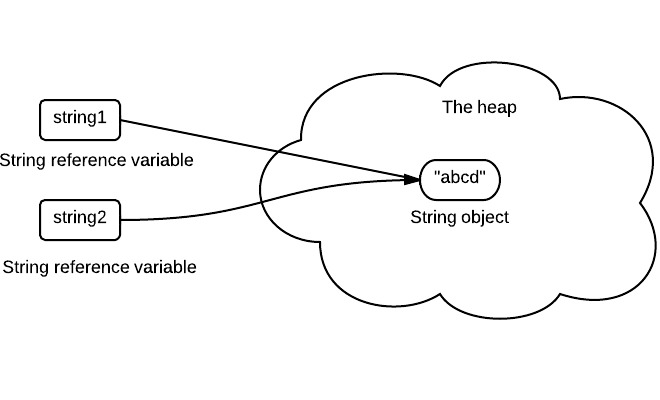Why Are Strings Immutable in Java? Finest Practices and Usage Instances
Why Are Strings Immutable in Java? Finest Practices and Usage Instances
Blog Article
What Is Unalterable Strings and Just How It Works
In the realm of programs, comprehending the principle of immutable strings is critical for creating safe and robust applications. Immutable strings refer to strings that can not be changed after they are created, making certain information stability and predictability within the code. This basic concept plays a critical duty in different programs languages and offers an unique technique to managing data. By discovering the ins and outs of just how immutable strings operate, one can reveal a globe of benefits and possibilities that can raise the high quality and efficiency of software program growth.
The Fundamentals of Unalterable Strings
Immutable strings, as a fundamental idea in programming, are character sequences that can not be changed as soon as they are developed. This means that when a string is appointed a worth, that worth can not be changed. In languages like Python and Java, strings are immutable items, causing numerous implications in regards to memory administration and information stability.
Among the essential advantages of immutable strings is that they offer a complacency in data adjustment. Considering that the content of an unalterable string can not be customized, it makes certain that the original information stays undamaged, reducing the danger of unintended changes throughout program implementation (Why are strings immutable in Java?). This residential property likewise streamlines debugging processes, as programmers can rely on that when a string is defined, its worth will not be inadvertently altered
When a new string is produced based on an existing one, rather than customizing the original string, the new value is stored separately. Overall, comprehending the essentials of immutable strings is important for understanding programming principles and optimizing code performance.
Advantages of Immutable Strings
Building upon the safety and performance benefits of immutable strings, their benefits expand to improving code integrity and streamlining concurrent shows tasks. By being immutable, strings can not be customized after creation, which gets rid of the danger of unintentional modifications in the data they save. This integral immutability ensures that when a string is created, its value continues to be consistent throughout the program's implementation, lowering the possibilities of insects triggered by unexpected modifications.
In addition, immutable strings add to code dependability by making it simpler to reason regarding the state of a program. Since strings can not be changed, developers can trust that a string will constantly hold the exact same worth, simplifying debugging and upkeep efforts. This predictability causes much more steady and dependable codebases.

Implementation in Programming Languages
Within various programming languages, the incorporation of immutable strings is an essential facet that affects exactly how information is taken care of and controlled within code structures. The implementation of immutable strings varies across different shows languages, with each language providing its own devices to sustain this concept.

On the other hand, languages like C and C++ do not have integrated assistance for immutable strings. Programmers in these languages must manually execute immutability by imposing regulations within their code to protect against straight adjustments to string items.
Finest Practices for Functioning With Unalterable Strings
When handling unalterable strings in shows languages like Java and Python, adhering to finest practices makes sure efficient and secure data control. Among the vital ideal techniques is to make use of StringBuilder or StringBuffer rather than straight manipulating strings, particularly when taking care of substantial concatenation procedures. These classes offer mutable alternatives for string adjustment, helping to stay clear of unneeded memory allocations and improving performance.
In addition, web when working with sensitive data such as passwords or API keys, it is crucial to prevent saving them as plain text in unalterable strings. Making use of secure storage space devices like char selections or specialized collections for taking care of delicate information aids minimize safety threats associated with unalterable strings.
Real-world Applications and Examples
Discovering functional implementations of unalterable strings in various sectors reveals their substantial influence on data integrity and system integrity. In the medical care sector, unalterable strings play a vital function in making certain the security and discretion of individual information. By preventing unapproved modifications to delicate information such as medical documents and prescriptions, unalterable strings aid preserve compliance with rigorous privacy guidelines like pop over to this web-site HIPAA.
Financial organizations likewise gain from the unalterable nature of strings to enhance the safety and security of customer information and purchase documents. Immutable strings help prevent scams and unapproved alterations to economic details, supplying a durable protection versus cyber dangers and making sure the trust fund and self-confidence of clients.

Conclusion
Finest methods for functioning with unalterable strings include preventing direct adjustments and making use of approaches that return new string objects. Real-world applications of unalterable strings consist of data file encryption, caching, and string control jobs.
Unalterable strings refer to strings that can not be altered after they are developed, guaranteeing information honesty and predictability within the code. When a brand-new string is developed based on an existing one, rather than modifying the initial string, the brand-new value is stored separately.In languages like Java and Python, strings are immutable by default, indicating that when a string item is developed, its value can not be changed - Why are strings immutable in Java?. Ideal techniques for working with immutable strings include staying clear of straight adjustments and using methods that return brand-new string objects. Real-world applications of immutable strings consist of data file encryption, caching, and string adjustment jobs
Report this page